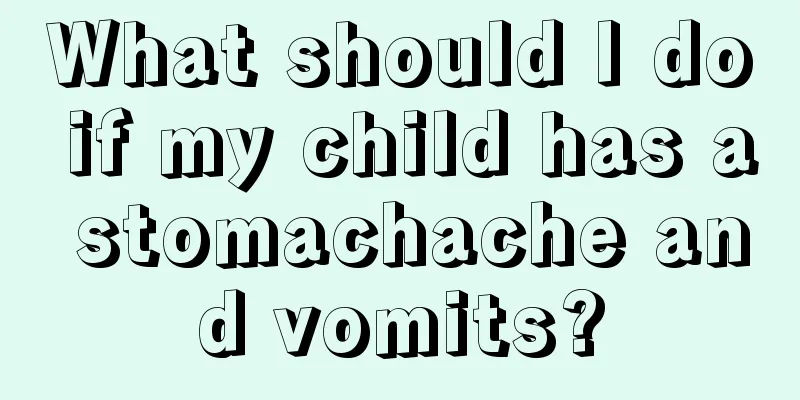What are the clinical symptoms of indigestion in babies?

|
Indigestion is a disease that is very common in adults, and babies are also prone to it. This disease is more common in infants and young children. It is a digestive tract disease of infants and young children. The symptoms of indigestion in babies are not very different from those in adults. This requires everyone to understand some knowledge in this regard. So, what are the clinical symptoms of indigestion in babies? Let me introduce them to you below. The main symptom of indigestion in babies is green stools, often accompanied by fever, abdominal distension, vomiting, refusal to eat, crying and restlessness. 1. Diarrhea: Indigestion is divided into simple indigestion and toxic indigestion. The symptoms of simple indigestion are diarrhea less than 10 times a day, yellow or green stools with little water, abdominal bloating, occasional vomiting, and sometimes fever, but not too high. The sick child has a poor appetite but is in good spirits. The condition of toxic indigestion is more serious, with sudden onset and high fever. The patient usually has about 10 bowel movements a day, but some may have more bowel movements. The stool is often watery or egg drop soup-like, with no feeling of tenesmus (sinking). Vomiting is frequent, up to 10 times a day, causing severe dehydration. The sick child may even have convulsions and lose consciousness, which may result in death if not treated early. 2. Foul-smelling stool: When accompanied by a small amount of undigested food residue, although it is not loose diarrhea, it is a sign of food poisoning and diarrhea. At this time, you should immediately reduce the amount of food and make adjustments to avoid diarrhea. 3. Refusing to eat: When a child occasionally has a loss of appetite, refuses to eat, or the food does not taste good, there is no need to emphasize eating, but let him skip a meal. 4. Restless sleep at night: crying, hot palms, kicking off quilt and clothes, sweating on the head just after falling asleep, it is due to excessive food accumulation in the stomach and intestines causing internal heat. As the saying goes, "If you want a child to be at peace, keep him a little hungry and cold" and "If the stomach is not in harmony, he will have a restless night." As children grow older, especially after adding complementary foods, they should be careful not to eat too much at dinner. Children around 1 year old should not drink or eat a large meal before going to bed. 5. Flushed cheeks: Children's cheeks may become flushed in the afternoon or evening when they stop eating. Children who have ingested a lot of food may have red cheeks and rough facial skin. The redness may be more severe if the environment is slightly hot. At this time, you can go on a diet, eat less staple food, and replace it with vegetables and fruits to aid digestion. 6. Bad breath: When milk and food accumulate in the stomach, bad breath often occurs first, especially bad breath and sour mouth in the morning, which are manifestations of milk and food stagnation. Clinically, this is called high-level food withdrawal. When this happens, you can reduce your food intake or skip one meal to help recover your gastrointestinal function. The above content introduces the clinical symptoms of baby indigestion. Of course, there are reasons for baby indigestion. In many cases, it is because of the child’s gastrointestinal dysfunction, and some children have decreased resistance, reduced gastric acid secretion, or eat the wrong food. Therefore, parents should pay attention to these situations to avoid indigestion in children. |
<<: What to eat for baby with indigestion
>>: What are the symptoms of indigestion in babies?
Recommend
Child foaming at mouth
When many parents take care of their children, th...
What to do if your baby is short
Basically every parent hopes that their children ...
Is it okay for children to crawl to sleep?
People sleep in many postures. The most common on...
What is the matter with the child's blue poop?
After having a baby in the family, many things be...
What are the dangers of spanking a child on the back?
Quality-oriented education is now advocated, whic...
How to nourish your child's brain
Every parent hopes that their child will be intel...
What should I do if my child has red bloodshot eyes?
Children's eyes are a part of their body that...
Why does my baby have repeated fever? Let you understand the full reasons
It is common for children to have fever symptoms ...
What to do if your 50-day-old baby has a stuffy nose
Babies who are about 50 days old are already one ...
Precautions for taking children's cough syrup
Children often cough after catching a cold. If yo...
What to do if your child has anal fissure bleeding
Children love to move around and want to run outs...
What kind of milk is suitable for a three-year-old child?
Three-year-old babies are in the period of growth...
What are the screening criteria for childhood leukemia?
According to incomplete survey results, the numbe...
What are the symptoms of a child choking on his trachea while eating?
If a child chokes on food while eating, parents n...
Baby gastrointestinal care
Babies' physical changes are relatively large...









